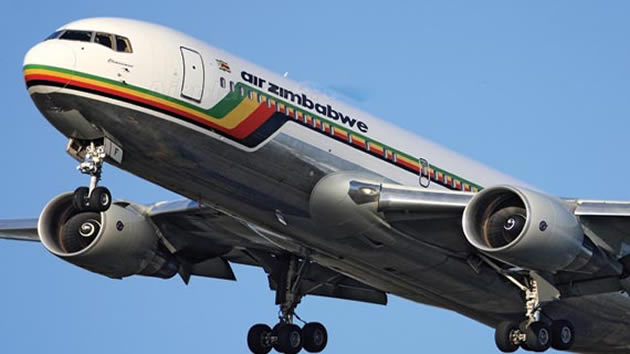Wanted: Technical partner, strategic thinkers

Zvamaida Murwira Mr Speaker, Sir
The failure by Air Zimbabwe to fully utilise the aviation space has created a business boom for other airlines which now ply the routes that should have ordinarily been serviced by the national flag carrier.
Air Zimbabwe has for a long period not been flying to Europe yet the London route had over the years been its cash cow.
Parliament’S recent call to have strategic thinkers at Air Zimbabwe dovetails with a recent Cabinet directive for the Ministry of Transport and Infrastructural Development to identify a technical partner for the national airline.
This is so because identifying a technical partner for the national airline in the absence of strategic thinkers to steer the national flag carrier might not produce the much needed turnaround consistent with what is envisaged by Government’s economic blueprint, Zim-Asset.
In its interactive meetings last month, Parliament’s Portfolio Committee on Transport and Infrastructural Development took to task board and management at the national airline, particularly on their capacity to turn it around in the wake of successive losses over the years.
The committee, chaired by Chegutu West Member of National Assembly Cde Dexter Nduna (Zanu-PF), queried the credentials of board members chaired by Mr Abdulman Harid in the context of the national flag carrier being technically insolvent and had been so for several years and yearned for a turn-around strategy.
In the end, legislators requested the board to furnish them with their curricular vitae.
On the other hand, three weeks ago, Minister Obert Mpofu announced that Cabinet had directed him to look for a technical partner for the national airline.
Mr Speaker Sir, all this shows that both the Legislature and the Executive are worried and determined to have the airline back on its feet.
It shows that both arms of the State are worried at the performance of the national airline which requires far- reaching strategic measures that can only be executed by strategic thinkers.
There is therefore need to blend these fundamental elements, that is, the desire to have a viable technical partner and to have strategic thinkers to execute the task.
In announcing the Cabinet directive, Minister Mpofu said his ministry would compile a list of possible technical partners and the criteria to engage them.
“We hope that the airline will be able to attract fresh capital and improve on its competitiveness,” said Minister Mpofu in a statement.
The directive by Cabinet comes as Air Zimbabwe is faced with financial challenges and a debt burden of more than $188 million.
The airline is embroiled in a multimillion-dollar insurance scam involving former company secretary Mrs Grace Pfumbidzayi and former chief executive officer Dr Peter Chikumba, who have since been convicted and sentenced to lengthy custodial prison terms.
This creates anxiety on any progressive person as to whether there are people at Air Zimbabwe not only committed to good corporate governance but with deep intellectual reservoir to be utilised during the trying times that the country is currently facing.
At the moment, Air Zimbabwe is being run by an acting chief executive officer, Mr Edmund Makona.
Parliament once raised corporate governance issues on the airline after it emerged that acting board chairperson Mr Harid was doubling as finance director.
What exposed the situation as awkward was that when asked, Mr Harid told legislators that he reported to the CEO, Mr Makona, when performing his duties as finance director while Mr Makona reported to him once he put on his hat as board chairperson.
Legislators saw a conflict of interest in the arrangement as it would lead to a “scratch my back and I will scratch yours” scenario.
Minister Mpofu said he had since resolved the issue by ensuring that Mr Harid put on one hat, that of board chairperson.
Cde Nduna said there was need to have the best brains in the aviation industry.
“We need strategic thinkers in our aviation industry. The industry is critical in boosting the economy particularly enhancing tourism and investment and supporting Government’s economic blueprint Zim-Asset,” said Cde Nduna in an interview yesterday.
He said when a national airline failed to rise to expectations, as people’s representatives, they were duty bound to interrogate the credentials of those steering it as part of their oversight role.
“We will not rest in our endeavour to see Air Zimbabwe playing its role in the economy. One aspect is that it must be in the hands of the right people to revamp the aviation sector. We have since received their CVs and (are) studying them. We will deliberate on that issue and make our recommendations accordingly in Parliament,” said Cde Nduna.
Cde Nduna also said there was need to have people in substantive positions so that they fully implement the turn-around strategy.
He said the national airline was flying close to 40 passengers on the Boeing 767 and 737 planes yet they had a carrying capacity of 200 and 105 respectively, meaning the airline was operating at almost 40 percent of capacity.
“But the handling fees, landing fees remain constant because of the weight of the aircraft and the size of the aircraft,” said Cde Nduna.
There have been views that Air Zimbabwe was being hamstrung by legacy issues because it was saddled with a huge debt.
Proposals have been made that Government takes over the debt so that it begins on a clean sheet.
Mr Speaker Sir, before that debate can be entertained, there is need to tackle preliminary issues first.
These issues are whether people with the requisite professional and technical skills are running affairs at the national airline.
Another issue is that of identifying a viable technical partner.
The failure by Air Zimbabwe to fully utilise the aviation space has created a business boom for other airlines which now ply the routes that should have ordinarily been serviced by the national flag carrier.
Air Zimbabwe has for a long period not been flying to Europe yet the London route had over the years been its cash cow.
It is crucial for Airzim to diversify its operations and consider partnerships with regional and international airlines to increase capacity and revive the ailing airline.
More than $300 million is needed to resuscitate the airline.
Cde Nduna noted that the national airline did not have an internet booking engine which allows customers to book flights online.
“The opinion of the committee is that the marketing team for Air Zimbabwe is non-existent,” Cde Nduna said.
In his evidence before the committee last month, Mr Makona said the national flag carrier had a huge debt overhang and was struggling to secure funding due to legacy issues.
Air Zimbabwe made a loss of $45 million in 2010 before reducing this to $28 million in 2011 and $26 million in 2012. The losses, however, widened to $39,4 million in 2013.
He said the national airline had three operational aircraft. He said they were in talks with Canadian aeroplane maker Bombardier and Boeing to lease planes as one of the company’s strategies to increase its route network.
Mr Makona said in the long run they would acquire a Dreamliner to service international routes.
With a new technical partner and strategic thinkers, one hopes that is what the doctor ordered for a turnaround at the airline.









Comments